Signup For Our Newsletter
Some researchers believe that CoQ10 may help with heart-related conditions, because it can improve energy production in cells, prevent blood clot formation, and act as an antioxidant.
Uses
Some studies suggest that coenzyme Q10 supplements, either by themselves or in with other drug therapies, may help prevent or treat the following conditions:
After Heart Attack
One clinical study found that people who took daily CoQ10 supplements within 3 days of a heart attack were less likely to have subsequent heart attacks and chest pain. They were also less likely to die of heart disease than those who did not take the supplements. Anyone who has had a heart attack should talk with their health care provider before taking any herbs or supplements, including CoQ10.
Heart failure (HF)
There is evidence that CoQ10 may help treat heart failure when combined with conventional medications. People who have congestive heart failure, where the heart is not able to pump blood as well as it should may also have low levels of CoQ10. Heart failure can cause blood to pool in parts of the body, such as the lungs and legs. It can also cause shortness of breath. Several clinical studies suggests that CoQ10 supplements help reduce swelling in the legs; reduce fluid in the lungs, making breathing easier; and increase exercise capacity in people with heart failure. But not all studies are positive, and some found no effect, so using CoQ10 for heart failure remains controversial. You should never use CoQ10 itself to treat heart failure, and you should ask your provider before taking it for this condition.
High blood pressure
Several clinical studies involving small numbers of people suggest that CoQ10 may lower blood pressure. However, it may take 4 to 12 weeks to see any change. In one analysis, after reviewing 12 clinical studies, researchers concluded that CoQ10 has the potential to lower systolic blood pressure by up to 17 mm Hg and diastolic blood pressure by 10 mm Hg, without significant side effects. More research with greater numbers of people is needed. DO NOT try to treat high blood pressure by yourself. See your provider for treatment.
High cholesterol
People with high cholesterol tend to have lower levels of CoQ10, so CoQ10 has been proposed as a treatment for high cholesterol, but scientific studies are lacking. There is some evidence it may reduce side effects from conventional treatment with cholesterol-lowering drugs called statins, which reduce natural levels of CoQ10 in the body. Taking CoQ10 supplements can bring levels back to normal. Plus, studies show that CoQ10 may reduce the muscle pain associated with statin treatment. Ask your provider if you are interested in taking CoQ10 with statins.
Diabetes
CoQ10 supplements may improve heart health and blood sugar and help manage high blood pressure in people with diabetes. Preliminary studies found that CoQ10 improves blood sugar control. But other studies show no effect. If you have diabetes, talk to your doctor or registered dietitian before taking CoQ10.
Heart damage caused by chemotherapy
Several clinical studies suggest that CoQ10 may help prevent heart damage caused by certain chemotherapy drugs, adriamycin, or other athracycline medications. More studies are needed. Talk to your provider before taking any herbs or supplements if you are undergoing chemotherapy.
Heart surgery
Clinical research indicates that introducing CoQ10 prior to heart surgery, including bypass surgery and heart transplantation, can reduce damage caused by free radicals, strengthen heart function, and lower the incidence of irregular heart beat (arrhythmias) during the recovery phase. You should not take any supplements before surgery unless your provider approves.
Gum (Periodontal) disease
Gum disease is a common problem that causes swelling, bleeding, pain, and redness of the gums. Clinical studies show that people with gum disease tend to have low levels of CoQ10 in their gums. A few studies with small numbers of people found that CoQ10 supplements led to faster healing and tissue repair, but more research is needed.
Other
Preliminary clinical studies also suggest that CoQ10 may:
- Improve immune function in people with HIV or AIDS
- Increase sperm motility, improving male fertility
- Be used as part of the treatment for Parkinson disease
- Improve exercise ability in people with angina
- Help prevent migraines
Scientific studies are needed to see whether CoQ10 can be safely and effectively used for these health problems and needs.
Dietary Sources
Primary dietary sources of CoQ10 include oily fish (such as salmon and tuna), organ meats (such as liver), and whole grains. Most people get enough CoQ10 through a balanced diet, but supplements may help people with particular health conditions (see Uses section), or those taking certain medications (see Interactions section).
Available Forms
CoQ10 is available as a supplement in several forms, including soft gel capsules, oral spray, hard shell capsules, and tablets. CoQ10 is also added to various cosmetics.
How to Take It
Pediatric
DO NOT give CoQ10 to a child under 18 except under the supervision of a health care provider.
Adult
For adults 19 years and older: The recommended dose for CoQ10 supplementation is 30 to 200 mg daily. Soft gels tend to be better absorbed than capsules or other preparations. Higher doses may be recommended for specific conditions.
CoQ10 is fat soluble, so it should be taken with a meal containing fat so your body can absorb it. Also, taking CoQ10 at night may help with the body’s ability to use it.
Precautions
Because of the potential for side effects and interactions with medications, you should take dietary supplements only under the supervision of a knowledgeable health care provider.
CoQ10 appears to be safe with no major side effects, except occasional stomach upset. However, researchers have not done studies and do not know if CoQ10 supplements are safe during pregnancy and breastfeeding.
CoQ10 may lower blood sugar, so people with diabetes should talk with their provider before taking it to avoid the risk of low blood sugar. Some suggest that it may also lower blood pressure.
Possible Interactions
If you are being treated with any of the following medications, you should not use CoQ10 without first talking to your health care provider.
Chemotherapy medications: Researchers are not sure whether CoQ10’s antioxidant effect might make some chemotherapy drugs less effective. Ask your oncologist before taking antioxidants or any supplement along with chemotherapy.
Daunorubicin and doxorubicin: CoQ10 may help reduce the toxic effects on the heart caused by daunorubicin (Cerubidin) and doxorubicin (Adriamycin), two chemotherapy medications that are used to treat several kinds of cancer. Ask your oncologist before taking antioxidants or any supplement along with chemotherapy.
Blood pressure medications: CoQ10 may work with blood pressure medications to lower blood pressure. In a clinical study of people taking blood pressure medications, adding CoQ10 supplements allowed them to reduce the doses of these medications. More research is needed, however. If you take medication for high blood pressure, talk to your provider before taking CoQ10, and DO NOT stop taking your regular medication.
Blood-thinning medications: There have been reports that CoQ10 may make medications such as warfarin (Coumadin) or clopidigrel (Plavix) less effective at thinning the blood. If you take blood thinners, ask your provider before taking CoQ10.
Betaxolol (Betoptic): CoQ10 supplements may reduce the heart-related side effects of betaxolol drops (Betoptic), a beta-blocker medication used to treat glaucoma, without making the medication any less effective.
Other: Medications that can lower the levels of CoQ10 in the body include:
- Statins for cholesterol, including atorvastatin (Lipitor), lovastatin (Mevacor), pravastatin (Pravachol), and simvastatin (Zocor)
- Fibric acid derivatives for cholesterol, including gemfibrozil (Lopid)
- Beta-blockers for high blood pressure, such as atenolol (Tenormin), labetolol (Normodyne), metoprolol (Lopressor or Toprol), and propranolol (Inderal)
- Tricyclic antidepressant medications, including amitriptyline (Elavil), doxepin (Sinequan), and imipramine (Tofranil).
Supporting Research
Aguilaniu H, Durieux J, Dillin A. Metabolism, ubiquinone synthesis, and longevity. Genes Dev. 2005;19(20):2399-406.
Al-Hasso. Coenzyme Q10: a review. Hosp Pharm. 2001;36(1):51-66.
Beal MF. Therapeutic effects of coenzyme Q10 in neurodegenerative diseases. Methods Enzymol. 2004;382:473-87.
Belardinelli R, Mucaj A, Lacalaprice F, et al., Coenzyme Q10 and exercise training in chronic heart failure. Eur Heart J. 2006;27(22):2675-81.
Berthold HK, Naini A, Di Mauro S, Hallikainen M, Gylling H, Krone W, Gouni-Berthold I. Effect of ezetimibe and/or simvastatin on coenzyme Q10 levels in plasma: a randomised trial. Drug Saf. 2006;29(8):703-12.
Caso G, Kelly P, McNurlan MA, Lawson WE. Effect of coenzyme q10 on myopathyic symptoms in patients treated with statins. Am J Cardiol. 2007;99(10):1409-12.
Dhanasekaran M, Ren J. The emerging role of coenzyme Q-10 in aging, neurodegeneration, cardiovascular disease, cancer and diabetes mellitus. Curr Neurovasc Res. 2005;2(5):447-59.
de Bustos F, Molina JA, Jimenez-Jimenz FJ, Garcia-Redondo A, Gomez-Escalonilla C, Porta-Etessam J, et al. Serum levels of coenzyme Q10 in patients with Alzheimer’s disease. J Neural Transm. 2000;107(2):233-239.
Heck AM, DeWitt BA, Lukes AL. Potential interactions between alternative therapies and warfarin. Am J Health-System Pharm. 2000;57(13):1221-1227.
Hodgson JM, Watts GF, Playford DA, et al. Coenzyme Q(10) improves blood pressure and glycaemic control: a controlled trial in subjects with type 2 diabetes. Eur J Clin Nutr. 2002;56:1137-1142.
Khan M, Gross J, Haupt H, et al., A pilot clinical trial of the effects of coenzyme Q10 on chronic tinnitus aurium. Otolaryngol Head Neck Surg. 2007;136(1):72-7.
Khatta M, Alexander BS, Krichten CM, Fisher ML, Freudenberger R, Robinson SW et al. The effect of conenzyme Q10 in patients with congestive heart failure. Ann Int Med. 2000;132(8):636-640.
Kolahdouz Mohammadi R, Hosseinzadeh-Attar MJ, Eshraghian MR, Nakhjavani M, Khorami E, Esteghamati A. The effect of coenzyme Q10 supplementation on metabolic status of type 2 diabetic patients. Minerva Gastroenterol Dietol. 2013;59(2):231-6.
Lafuente R, Gonzalez-Comadran M, Sola I, et al. Conezyme Q10 and male infertility: a meta-analysis. J Assist Reprod Genet. 2013;30(9):1147-56.
Langsjoen PH, Langsjoen JO, Langsjoen AM, Lucas LA. Treatment of statin adverse effects with supplemental Coenzyme Q10 and statin drug discontinuation. Biofactors. 2005;25(1-4):147-52.
Lee BJ, Tseng YF, Yen CH, Lin PT. Effects of coenzyme Q10 supplementation (300mg/day) on antioxidation and anti-inflammation in coronary artery disease patients during statins therapy: a randomized, placebo-controlled trial. Nutr J. 2013;12(1):142.
Levy G, Kaufmann P, Buchsbaum R, et al., A two-stage design for a phase II clinical trial of coenzyme Q10 in ALS. Neurology. 2006;66(5):660-3.
Madmani ME, Yusuf Solaiman A, Tamr Agha K, et al. Coenzyme Q10 for heart failure. Cochrane Database Syst Rev . 2014; 6:CD008684.
McCarty MF. Toward practical prevention of type 2 diabetes. Med Hypotheses. 2000;54(5):786-793.
Nahas R. Complementary and alternative medicine approaches to blood pressure reduction: An evidence-based review. Can Fam Physician. 2008 Nov;54(11):1529-33. Review.
Ochiai A, Itagaki S, Kurokawa T, Kobayashi M, Hirano T, Iseki K. Improvement in intestinal coenzyme q10 absorption by food intake. Yakugaku Zasshi. 2007;127(8):1251-4.
Ostrowski RP. Effect of coenzyme Q(10) on biochemical and morphological changes in experimental ischemia in the rat brain. Brain Res Bull. 2000;53(4):399-407.
Palan PR, Connell K, Ramirez E, Inegbenijie C, Gavara RY, Ouseph JA, Mikhail MS. Effects of menopause and hormone replacement therapy on serum levels of coenzyme Q10 and other lipid-soluble antioxidants. Biofactors. 2005;25(1-4):61-6.
Quinzii CM, Dimauro S, Hirano M. Human coenzyme q(10) deficiency. Neurochem Res. 2007;32(4-5):723-7.
Raitakari OT, McCredie RJ, Witting P, Griffiths KA, Letter J, Sullivan D, Stocker R, Celermajer DS. Coenzyme Q improves LDL resistance to ex vivo oxidation but does not enhance endothelial function in hypercholesterolemic young adults. Free Radic Biol Med. 2000;28(7):1100-1105.
Rakel D. Rakel: Integrative Medicine. 2nd ed. Philadelphia, PA: Elsevier Saunders; 2007.
Rosenfeldt FL, Haas SJ, Krum H, Hadj A, Ng K, Leong JY, Watts GF. Conenzyme Q10 in the treatment of hypertension: a meta-analysis of the clinical trials. J Hum Hypertens. 2007;21(4):297-306.
Rosenfeldt F, Hilton D, Pepe S, Krum H. Systematic review of effect of coenzyme Q10 in physical exercise, hypertension and heart failure. Biofactors. 2003;18(1-4):91-100.
Salles JE, Moises VA, Almeida DR, Chacra AR, Moises RS. Myocardial dysfunction in mitochondrial diabetes treated with Coenzyme Q10. Diabetes Res Clin Pract. 2006;72(1):100-3.
Sander S, Coleman CI, Patel AA, Kluger J, White CM. The impact of coenzyme Q10 on systolic function in patients with chronic heart failure. J Card Fail. 2006;12(6):464-72.
Shults CW, Haas R. Clinical trials of coenzyme Q10 in neurological disorders. Biofactors. 2005;25(1-4):117-26.
Shults CW. Therapeutic role of coenzyme Q(10) in Parkinson’s disease. Pharmacol Ther. 2005;107(1):120-30.
Singh U, Devaraj S, Jialal I. Coenzyme Q10 supplementation and heart failure. Nutr Rev. 2007;65(6 Pt 1):286-93.
Spigset O. Reduced effect of warfarin caused by ubidecarenone. Lancet. 1994;344:1372-1373.
Torkos S. Drug-nutrient interactions: A focus on cholesterol-lowering agents. Int J Integrative Med. 2000;2(3):9-13.
Watson PS, Scalia GM, Galbraith A, et al. Lack of effect of coenzyme Q on left ventricular function in patients with congestive heart failure. J Am Coll Cardiol. 1999;33:1549-1552.
Weant KA, Smith KM. The role of coenzyme Q10 in heart failure. Ann Pharmacother. 2005;39(9):1522-6.
Witte KK, Clark AL, Cleland JG. Chronic heart failure and micronutrients. J Am Coll Cardiol. 2001;37(7):1765-1774.
Be the first to review “COQ10” Cancel reply
You must be logged in to post a review.
Related products
Catie's Organics
Catie's Organics
Catie's Organics


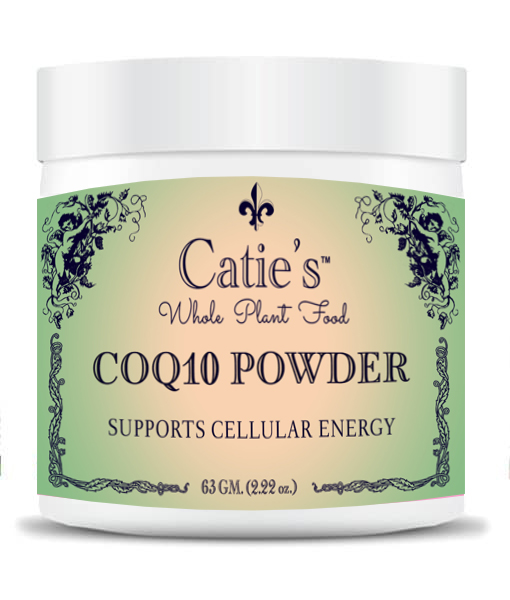
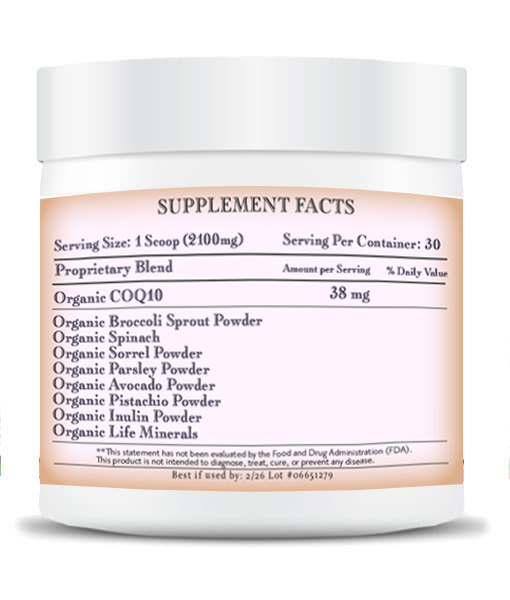
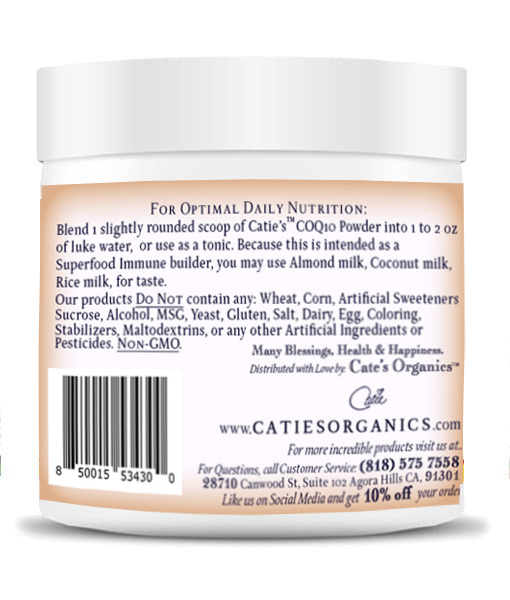
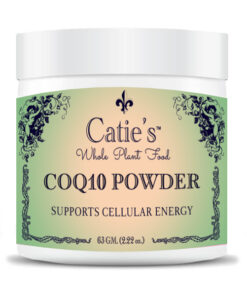
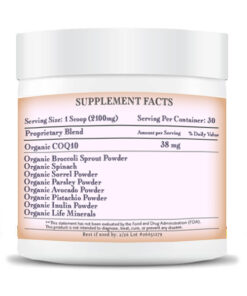
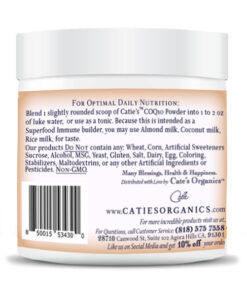
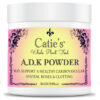
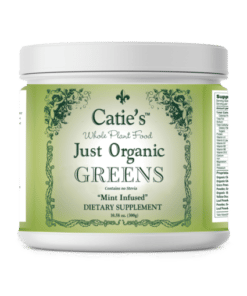
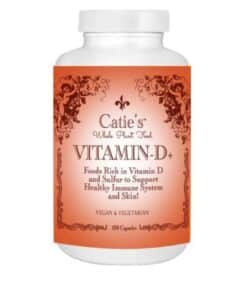
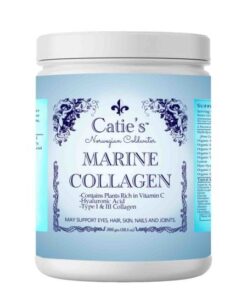


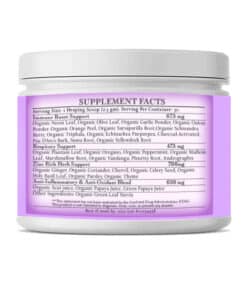

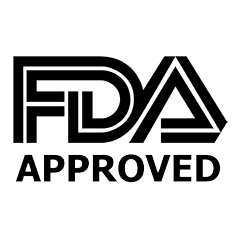
Reviews
There are no reviews yet.